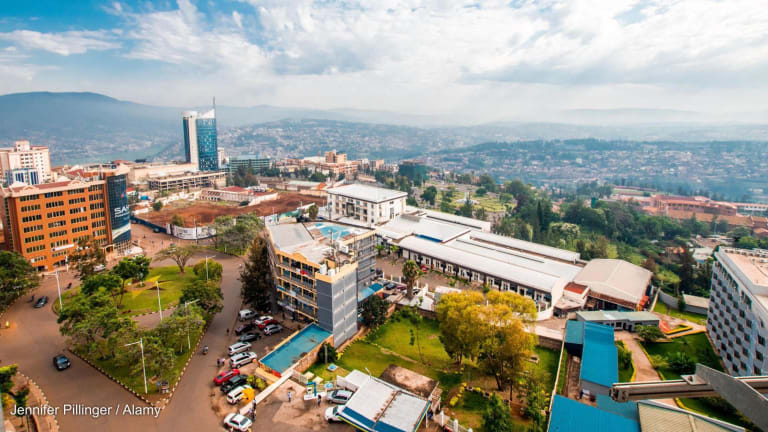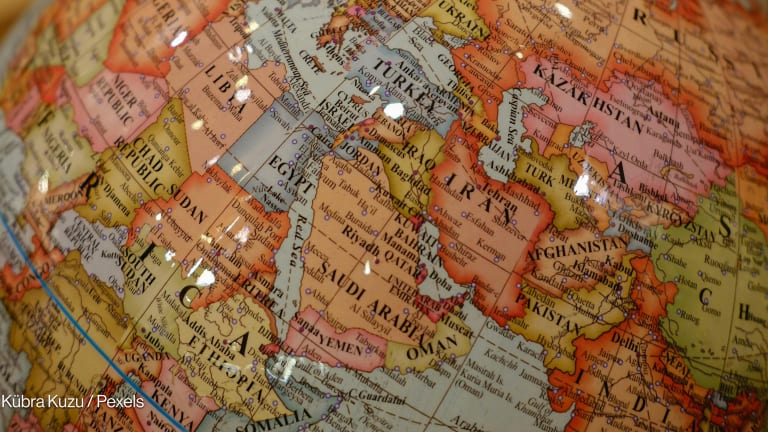Top global development employers in Vienna: A primer
<p>Vienna is a major global international cooperation hub, thanks largely to its large U.N. contingent. But the picturesque city on the banks of Danube also boasts a variety of donor agencies, humanitarian relief groups and consulting firms. Here’s a look at the Austrian capital’s top aid and foreign affairs organizations.</p>
Every day, more than 4,000 people walk in and out of a massive complex on the Viennese banks of the Danube river. The campus features six Y-shaped towers encircling a cylindrical building as well as a conference facility that sees periodic gatherings of dignitaries stationed in the Austrian capital. The Vienna International Center has been an international cooperation hub since the Austrian government handed over the property to the United Nations and the International Atomic Energy Agency in 1979. Known as UNO City, the 180,000-square-meter area has extraterritorial status. Beyond the U.N. family at VIC, several international organizations, including the secretariat of the Organization for Security and Cooperation in Europe and the OPEC Fund for International Development, are seated in Vienna. OFID lies less than four kilometers – or 20 minutes by foot – from its benefactor, the Organization of Petroleum Exporting Countries. Vienna’s diverse development community also includes Austria’s bilateral aid agency, a global public-private partnership, national chapters of internationally known humanitarian-cum-development nonprofits and several consulting firms that also provide training services. Here are the top Vienna-based organizations carrying out relief and international development work. Find the latest vacancies in Vienna and beyond by visiting the Devex jobs board. Austrian Development Agency Type: government agency and bilateral donorFounded: 2004Managing director: Ambassador Brigitte Öppinger-Walchshofer ADA is part of the Austrian Federal Ministry for European and International Affairs and is the agency that implements the country’s 700 development aid programs and projects. It has 12 overseas offices, in Albania, Bhutan, Bosnia-Herzegovina, Burkina Faso, Ethiopia, Kosovo, Moldova, Mozambique, Nicaragua, the Palestinian territories, Serbia and Uganda. Aside from providing humanitarian aid for emergencies, ADAfinances development projects of Austrian non-governmental organizations in its partner countries and supports companies from Austria and the European Economic Area that make long-term investments in Africa, Asia, Latin America and southeastern Europe. CAPMEX Type: consultancyFounded: 2002Managing partners: Maria-Theresia Takacs and Hannes A. Takacs Formerly the consulting division of the Vienna Stock Exchange, CAPMEX offers services and solutions to aid capital market development, including capacity building and financial infrastructure enhancement. It has worked on projects funded by EuropeAid, the European Bank for Reconstruction and Development, U.S. Agency for International Development and World Bank. CAPMEX says its project management methodology is ISO 9002-certified and “is defined through standardized procedures and mechanisms accompanied by a project monitoring and auditing system.” CARE Austria Type:NGOFounded: 1986Managing Director: Andrea Wagner-Hager CARE Austria is one of 12 independent national organizations that make up CARE International. Since its establishment, the aid group has implemented 348 projects in 50 countries, benefiting around 50 million people. It says it invests 89 percent of funds received in projects and 8 percent in information and education efforts; 3 percent cover administration costs. In 2009, more than half of CARE Austria’s projects were in the Middle East. CaT Europe EEIG Type: consultancy and training agencyFounded: 2006General manager: Helmuth E. Kuntscher CaT Europe EEIG is the result of a merger between the Berufsförderungsinstitut Wien, a nonprofit vocational and training institute, and the development consultancy The Plan Consult Group. It renders services in the areas of institution building and strengthening; employment and social affairs; vocational and management training; transport; economy, export and foreign direct investment; and infrastructure. The Austrian government, European Commission, Organization for Economic Cooperation and Development, and World Bank are among CaT Europe EEIG’s clients. Hulla & Co. Human Dynamics KG Type: consultancyFounded: 1993Executive partner: Bernhard Hulla Hulla & Co. Human Dynamics KG provides technical assistance and training services to the public sector. It manages projects funded by the Austrian government, European Union and World Bank in the areas of economics, institution building and governance. It is actively recruiting experts for projects that it currently implements and is bidding for. Hulla & Co. is among the leading EuropeAid contractors, according to a site that tracks contracts from the EU aid agency. International Center for Migration Policy Development Type: international organizationFounded: 1992Director-general: Peter Widermann ICMPD has 12 member states, namely Austria, Bulgaria, Croatia, Czech Republic, Hungary, Poland, Portugal, Romania, Slovakia, Slovenia, Sweden and Switzerland. It aims to promote innovative, comprehensive and sustainable migration policies. It serves as secretariat for two forums tackling migration, the Budapest Process and the Dialogue on Mediterranean Transit Migration. ICMPD says its library boasts one of the largest migration-specific literature collections in Austria. OPEC Fund for International Development Type: multilateral donorFounded: 1976Director-general: Suleiman J. Al-Herbish Aside from providing financing to developing countries, OFIDworks promotes south-south cooperation. It offers various types of financing: public sector loans for development projects and programs; balance of payments support and debt relief under the Heavily Indebted Poor Countries Initiative; trade financing; support to private enterprises; grants for food and technical assistance, research and humanitarian relief work; and contributions to other development organizations for activities benefiting developing countries. As of March 31, 2011, it had committed $13.17 billion, of which $8.22 billion had been disbursed for various projects in the developing world. Renewable Energy and Energy Efficiency Partnership Type: international NGO and public-private partnershipFounded: 2002Director-general: Marianne Moscoso-Osterkorn Launched at the 2002 World Summit on Sustainable Development, the Renewable Energy and Energy Efficiency Partnership currently has more than 350 partners, including 45 governments as well as private companies and international organizations. It initiates and finances projects in two areas that it says “offer the greatest potential for developing the market for sustainable energy,” such as helping governments in creating favorable regulatory and policy frameworks and advancing innovative finance and business models to activate the private sector. It is funded by the governments of Australia, Austria, Canada, the European Union, Germany, Ireland, Italy, the Netherlands, New Zealand, Norway, Spain, the United Kingdom and the United States, as well as through private sector contributions. United Nations Office at Vienna Type: U.N. duty stationFounded: 1980Director-general: Yury Fedotov UNOV is one of four major duty stations of the United Nations, which also include those in New York, Geneva and Nairobi. It oversees the U.N. program on the peaceful uses of outer space and provides conference, information, security and safety, procurement services and general support to organizations based at the Vienna International Center. The U.N. pays the Austrian government a symbolic fee of one Austrian schilling, or about 0.07 euro, per year for 99 years starting in 1979 as rent for VIC. World Vision Austria Type:NGOFounded: 1998Managing director: Amanda Platzer World Vision Austria is part of the umbrella Christian relief and development agency World Vision International. Aside from implementing aid programs in developing countries, it performs advocacy work to build awareness in Austria on global poverty. It is funded by the Austrian government, the European Union and other public funders. Other notable organizations in Vienna - CEEN Economic Project and Policy Consulting GmbH - Center of Legal Competence - Finanzakademie Autria - HORIZONT3000 - Médecins Sans Frontières Austria - Organization for Security and Cooperation in Europe - Organization of Petroleum Exporting Countries United Nations and U.N.-related institutions in Vienna - International Money Laundering Information Network (IMOLIN) - International Narcotics Control Board (INCB) - International Trade Law Division of the United Nations Secretariat/United Nations Commission on International Trade Law (UNCITRAL) - Office of the United Nations High Commissioner for Refugees (UNHCR) - United Nations Environment Program (UNEP) - United Nations Environment Program – Interim Secretariat of the Carpathian Convention - United Nations Information Service (UNIS) - United Nations Office for Outer Space Affairs (OOSA) - United Nations Office for Project Services (UNPOS) - United Nations Office of Internal Oversight Services (OIOS) - United Nations Office on Drugs and Crime (UNODC) - United Nations Postal Administration (UNPA) - United Nations Register of Damage Caused by the Construction of the Wall in the Occupied Palestinian Territory (UNROD) - United Nations Scientific Committee on the Effects of Atomic Radiation (UNSCEAR) Did we forget any major aid organization based in Vienna? Please let us know by placing your comments below.
Every day, more than 4,000 people walk in and out of a massive complex on the Viennese banks of the Danube river. The campus features six Y-shaped towers encircling a cylindrical building as well as a conference facility that sees periodic gatherings of dignitaries stationed in the Austrian capital.
The Vienna International Center has been an international cooperation hub since the Austrian government handed over the property to the United Nations and the International Atomic Energy Agency in 1979. Known as UNO City, the 180,000-square-meter area has extraterritorial status.
Beyond the U.N. family at VIC, several international organizations, including the secretariat of the Organization for Security and Cooperation in Europe and the OPEC Fund for International Development, are seated in Vienna. OFID lies less than four kilometers – or 20 minutes by foot – from its benefactor, the Organization of Petroleum Exporting Countries.
This article is exclusively for Career Account members.
Unlock this article now with a 15-day free trial of a Devex Career Account. With a Career Account subscription you will get:
- Full access to our jobs board, including over 1,000 exclusive jobs
- Your Devex profile highlighted in recruiter search results
- Connections to recruiters and industry experts through online and live Devex events
Start my 15-day free trialAlready a user?
Printing articles to share with others is a breach of our terms and conditions and copyright policy. Please use the sharing options on the left side of the article. Devex Pro members may share up to 10 articles per month using the Pro share tool ( ).
Eliza Villarino currently manages one of today’s leading publications on humanitarian aid, global health and international development, the weekly GDB. At Devex, she has helped grow a global newsroom, with talented journalists from major development hubs such as Washington, D.C, London and Brussels. She regularly writes about innovations in global development.




